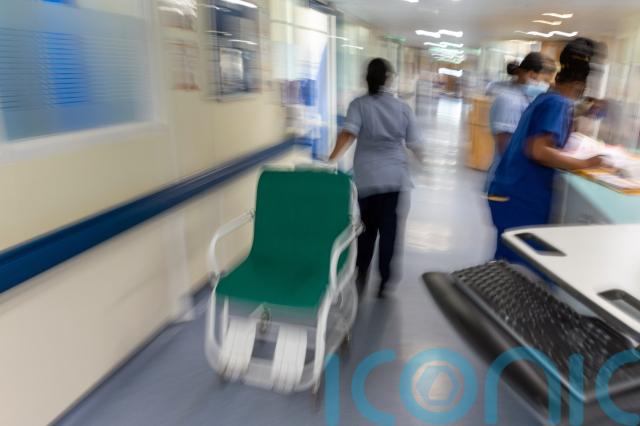
Hospitals in England will be paid to divert patients back into the community for treatment, under plans published by the NHS.
The new guidance will also introduce the first waiting times target for community services, as well as prioritising same-day GP appointments for patients in urgent need.
The moves are aimed at slashing waiting lists, which have increased for three consecutive months, and ensure 2.5 million fewer people are waiting more than 18 weeks for treatment by 2029.
The health service has also set a target for 85% of people with a cancer diagnosis to have their first treatment within two months of being referred to specialists by 2029.
Since this 62-day measure was introduced, the figure has never been higher than 71.7%.
The new document published by NHS England shows there will be financial incentives for hospitals to ensure more patients are treated in places such as community diagnostic centres, as set out in the Government’s plan for the health service.
According to NHS England, it will take action to improve GP access by consulting on a new priority to give same-day appointments for urgent patients.
The plan also sets a target for community health services to see 80% of patients within 18 weeks.
The latest figures show an estimated 7.41 million treatments were waiting to be carried out at the end of August, relating to 6.26 million patients, up slightly from 7.40 million treatments and 6.25 million patients at the end of July.
Sir Jim Mackey, chief executive of NHS England, said: “For too long the NHS has been stuck in a doom-loop of not being able to properly plan beyond each financial year and responding to overly bureaucratic processes that have stifled local leadership and innovation.
“We have to get out of the trap of short-term thinking and break the cycle of ‘just about managing’.
“Today’s publication – the product of intensive work over the summer by the NHS leadership community – resets how the NHS works, aligns incentives to delivering more care and creates a clear route map by which the NHS can meet its commitments on improving access to care and get waiting times back to where patients want and need them to be.”
The NHS is set to deliver faster care for millions of patients thanks to the most radical reset of the NHS in a generation.
Read more ➡️ https://t.co/4S4KE6AOxU pic.twitter.com/BC36iXfAts
— NHS England (@NHSEngland) October 24, 2025
Matthew Taylor, chief executive of the NHS Confederation, said health leaders will welcome the “ambitious plan” and how it will give them “more time to prepare their plans for the new financial year”.
He added: “It offers a path to recovery, but there are several key risks facing the NHS that stand in the way, not least from the absence of national funding for redundancy costs, further strike action and expected increases in drug pricing.
“NHS leaders support the Government’s reform agenda, but the plan is light on the role of neighbourhoods and their central role in bringing care out of hospitals.
“There also appears to be mixed messages over devolving power to local leaders while being prescriptive about what they need to deliver. We would also welcome more focus on waits in community and mental health services given the rising demand across these sectors.
“We are also concerned about setting such a high target for GPs to see same-day urgent cases.
“While our members recognise the need to prioritise access to general practice, adding such an ambitious target for the first time could significantly impact on the ability to deliver proactive and personalised care to patients, which will risk worsening health outcomes and impact on the rest of the system.”

NHS analysis suggests the target of 85% of people with a cancer diagnosis having their first treatment within two months of a referral could benefit more than 300,000 people, with the aim of treating 96% within a month.
The latest NHS England data for August shows 69.1% of patients had waited no longer than 62 days from an urgent suspected cancer referral, or consultant upgrade, to their first definitive treatment for cancer, down slightly from 69.2% in July.
The Government and NHS England have set a target of March for this figure to reach 75%.
Professor Peter Johnson, national clinical director for cancer at NHS England, said: “Getting back to delivering against these two key constitutional standards means faster cancer care is on the horizon for tens of thousands more patients.”
According to the plans, by 2029, 95% of appointments after triage will be available through the NHS App; only patients who need a scan will be offered one with the rollout of an online software platform that provides up-to-date clinical guidance; and areas of the country that fail to make progress on tackling unnecessary follow-up appointments will also be performance managed.
Sir Jim added: “The NHS needs to win back the confidence of the patients and communities it serves – so starting from now, every provider across the NHS will be required to more carefully measure what patients are telling them about their experience of care and act swiftly to fix the things that matter to them.”
Subscribe or register today to discover more from DonegalLive.ie
Buy the e-paper of the Donegal Democrat, Donegal People's Press, Donegal Post and Inish Times here for instant access to Donegal's premier news titles.
Keep up with the latest news from Donegal with our daily newsletter featuring the most important stories of the day delivered to your inbox every evening at 5pm.